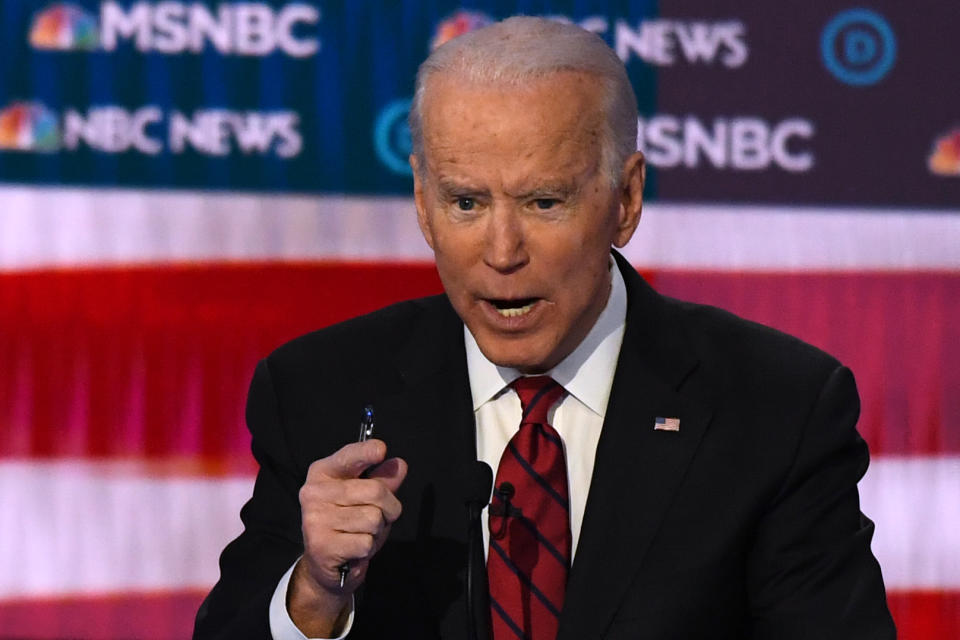Biden is relentless on one China issue: The New Silk Road
Presidential candidate Joe Biden has consistently blasted China’s colossal infrastructure initiative known as the Belt and Road Initiative (BRI), calling out the environmental harm resulting from the project.
The BRI — also known as the New Silk Road — is envisioned as a revival of an ancient trading route between China and Europe. Being a signature development finance play launched by Chinese President Xi Jinping, the country has poured billions of dollars into various economies in between — some of which are opaque — to expand influence around the world.
“China… and their Belt and Road proposal, they're taking the dirtiest coal in the world mostly out of Mongolia and spreading it all around the world,” the former U.S. vice president stated during the 9th Democratic presidential debate in Las Vegas. “It's clear.”

Biden’s previously laid out his objections to the BRI in his plan to address climate change.
“China is far and away the largest emitter of carbon in the world, and through its massive Belt and Road Initiative, Beijing is also annually financing billions of dollars of dirty fossil fuel energy projects across Asia and beyond,” he argued in his plan. He added that if elected president, he would “rally a united front of nations to hold China accountable to high environmental standards in its Belt and Road Initiative infrastructure projects, so that China can’t outsource pollution to other countries.”

‘Bribes to circumvent’ environmental studies
Researchers have consistently expressed concerns over the BRI’s environmental impact.
D.C-based think tank Center for a New American Security (CNAS) sounded the alarm last year, stressing that many of China’s projects — which span the continent from Africa to Latin America to Kazakhstan — “have proceeded without adequate environmental impact assessments or have involved targeted bribes to circumvent them.”
Citing a Bloomberg report, they noted that China’s investment in a Sri Lankan development project damaged 175 miles of coastline and impacted 80,000 households that rely on the sea to make a living.
According to data from Boston University, coal is one of the biggest energy sources for the BRI after oil, particularly in the Asia region. The majority of coal projects are concentrated in Indonesia, followed by Vietnam and Pakistan.

Jonathan Hilllman, director of the Reconnecting Asia Project at the D.C.-based Center for Strategic and International Studies, told Yahoo Finance that there were many examples of Chinese projects using “older, dirtier” technology in BRI countries like Pakistan.
Hillman added that Chinese officials have recognized and talked about the environmental impact of the BRI — Xi said in a keynote speech at the Belt and Road Forum last year that environmental protection is a major part of the initiative — but haven’t actually done much about it.
It “seems more like greenwashing than a consequential undertaking,” Hillman added.
Mongolia
While Biden’s assertion that China is taking coal out of Mongolia and spreading it around the world seems more of a simplification, the underlying point about Mongolia’s relationship with China is true.
Mongolia lies on an important corridor for China’s BRI, and is hoping to reap considerable benefits from its wealthier neighbor. But the economic situation in Mongolia is fragile. The country had received an International Monetary Fund-led bailout in 2017, and depends on China to buy more than 90% of its exports, according to official data.
And while the country has a ton of natural resources (coal, copper and gold), volatility in commodity prices wreak havoc on the country’s financial health since 90% of the exports are from one sector: mining.

The U.S. stance
Under Biden’s climate plan, the U.S. would offer alternative sources of capital to countries to finance lower-carbon energy investments, end existing subsidies on high-carbon products, monitor China’s progress on reducing the carbon footprint on the BRI and finally reform the IMF and regional development bank standards to de-prioritize high-cost and high-carbon impact projects.
In early 2020, the U.S. launched a BRI contender called the U.S. International Development Finance Corporation (DFC).
The agency was created to fund developments across the world. But “it’s hard to miss the fact that the White House is rolling this out so directly as a counter to China and the Belt and Road, as a source of competition,” the Center for Global Development’s Scott Morris said at the Development Finance in Fragile States conference in Princeton, New Jersey, last week.
China’s massive project “also underscores the need for U.S. revitalization, especially improving U.S. infrastructure,” Hillman said. “After all, the Trump administration and Congress were unable to pass a $200 billion package for infrastructure spending within the United States, and China is spending more than that beyond its borders.”
Presently, the coronavirus has reportedly put a damper on the BRI by putting pressure on labor as travel restrictions are preventing Chinese workers from getting to overseas projects and factories are cut off from the Chinese experts they need to keep running. Asian banks are also bracing for more pressure from disruptions in businesses across Asia, worrying about souring loans.
—
Aarthi is a reporter for Yahoo Finance. Follow her on Twitter @aarthiswami.
Read more:
EU on the New Silk Road: China is both a 'partner' and a 'systemic rival'
The new Silk Road is China's 'second pillar of legitimacy' — and Europe is starting to buy in
Read the latest financial and business news from Yahoo Finance
Follow Yahoo Finance on Twitter, Facebook, Instagram, Flipboard, SmartNews, LinkedIn, YouTube, and reddit.
